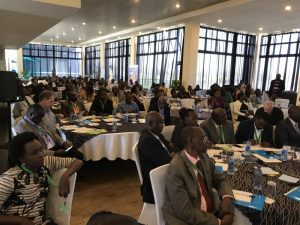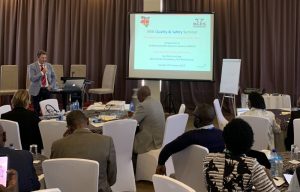This week, Martin de Jong and Dirk Harting attended a seminar in Nairobi that addressed the subject of Milk Quality & Food Safety. More than hundred representatives of the whole dairy value chain participated in this seminar, which was organised by SNV Netherlands Development Organisation and the Kenyan Dairy Board. The reason for organizing the seminar was that over the last decades the Kenyan dairy sector experienced challenges to comply with food safety standards of raw milk. The current volume based milk payment method does not provide enough incentive for farmers and dairy cooperatives to pay attention to and improve aspects of milk quality and thus food safety.
During the seminar, several stakeholders exchanged their experiences and ideas how to address the food safety aspects of raw milk. Our senior expert Martin de Jong – having much experience in Quality Based Milk Payment Systems (QBMPS) – presented its guidelines on how to introduce a QBMPS. It seems by now that all stakeholders – including government authorities – are aware of the need to introduce a QBMPS as main driver to improve the quality and safety of raw milk. However, the Kenyan milk market is complex and bringing the right systems and legislation in place requires careful implementation. Bles Dairies is keen to participate in and add value to this process!
Within the framework of another project, namely the SNV TIDE project in South-Western Uganda, Bles Dairies Consultancy was made responsible to design and implement a QBMPS. This QBMPS was the first of its kind in Uganda and comprised the introduction of milk quality parameters for raw milk collection at ten cooperative milk collection centres and fifteen milk traders. The milk traders supply milk to three different milk-processing plants. The processing companies committed themselves to pay a bonus in case raw milk collected is in accordance to the set quality parameters.
In the pilot more than 500 farmers were involved as well as ten farmers cooperatives. After a one-year training period, the QBMPS pilot was introduced. From May until December 2018, the milk quality was checked and in case the quality was not meeting the standards, the farmers were trained additionally with extra coaching. During the pilot phase not all MCCs were able to meet the standards, but still the processing companies paid out a total bonus of 294 million UGX (77,000 US$) to 350 farmers which means a huge incentive for the farmer to continue the production of good quality of milk.
Thanks to the success, the TIDE project and Bles Dairies Consultancy are now researching to what extent the QBMPS can be up scaled by involving more farmers, cooperatives, milk traders and processing plants in the region and in due time all over Uganda.


